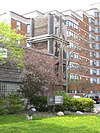Islington Avenue
  | |||||||
|---|---|---|---|---|---|---|---|
| York Regional Road 17 | |||||||
 Islington within Toronto (red line) | |||||||
| Maintained by | City of Toronto York Region | ||||||
| Length | 18.7 mi (30.1 km)[1] | ||||||
| Location | Toronto Vaughan | ||||||
| South end | Lake Shore Boulevard in Toronto | ||||||
| Major junctions | The Queensway Bloor Street Dundas Street Burnhamthorpe Road Eglinton Avenue Dixon Road Rexdale Boulevard Albion Road Finch Avenue Steeles Avenue | ||||||
| North end | in Vaughan | ||||||
| |||||||
Islington Avenue is a north-south route travelling through the City of Toronto and York Region. It runs from Lake Shore Boulevard West at 7th Street in the former Town of New Toronto to Highway 27 at the former town of Kleinburg, in the City of Vaughan north of Toronto. Islington Avenue is approximately 30.2 kilometres (18.7 mi) long. It runs through the former city of Etobicoke, serving as one of its main north-south arterials.
History
The street was first surveyed in 1799 (at the time, it was known as the Middle Road).[2] The originating section of Islington Avenue between Lake Shore Blvd. West and Birmingham Street in New Toronto, was originally Seventh Street until 1980, when Islington Avenue was extended south of Horner Avenue. This connection required a new alignment north of Birmingham Street, which crossed over to the top of Sixth Street before continuing north over the CNR Railway yards.
The stretch beyond Albion Road into York Region was originally part of a road connecting the former villages of Woodbridge and Weston. Beyond Woodbridge, the road continued north through Kleinburg as Islington Avenue does today.
At the end of the Second World War the street was widened, causing the loss of almost all historic buildings.[3]
In York Region, Islington Avenue was originally designated as York Regional Road 7, But In 1997, Islington Avenue was later changed to York Regional Road 17 due to Highway 7 being former highway to a York regional road. [4]
Route
Islington Avenue today begins at Lake Shore Boulevard West at 7th Street in the former Town of New Toronto on the shores of Lake Ontario, in the southwest area of the City of Toronto. It and proceeds north through the former village of Islington, from which it gets its name. At Dundas Street, is historic Montgomery's Inn, built in 1832, and now operated as a museum by the City of Toronto. It continues north through a series of nieghbourhoods of suburban Etobicoke including Richview, Kingsview Village, and Rexdale. At Finch Avenue it crosses the Humber River and enters the former city of North York, passing through the neighbourhood of Humber Summit. North of Steeles Avenue it enters the city of Vaughan, and passes through the communities of Woodbridge and Pine Grove before terminating at Highway 27 at the former town of Kleinburg.
Transit
Islington subway station opened on Bloor St in 1968. Today the 110 Islington South serves the street south of the station,[5] while the 37 Islington runs along the street from the station to Steeles. [6]
Landmarks
Landmarks and notable sites along Steeles from west to east
| Landmark | Cross street | Notes | Image |
|---|---|---|---|
| GO Transit Willowbrook Yard | Evans Ave | Crossed by an overpass | 
|
| Islington subway station | Bloor St | ||
| Montgomery's Inn | Dundas St | Historic structure | 
|
| St. George's Golf and Country Club | The Kingsway | ||
| Richview Collegiate Institute | Eglinton Ave | ||
| Don Bosco Catholic Secondary School | Dixon Rd | Former Keiller Mackay Collegiate Institute | 
|
| Rexdale Presbyterian Church | Rexdale Blvd | 
| |
| Thistletown Collegiate Institute | Elmhurst Dr | ||
| St. Roch's Roman Catholic Church | Finch Ave | 
| |
| Pine Ridge Cemetery | Finch Ave | 
| |
| Humber Summit Library | Steeles Ave | 
| |
| Boyd Conservation Area | Rutherford Rd |
References
- ^ "Steeles Ave. route". Google Maps. Retrieved April 2, 2017.
- ^ Brown 2020, p. 46.
- ^ Brown 2020, p. 47.
- ^ Video: Highway 7 Ontario - 1988; Shown on 3:01 https://m.youtube.com/watch?v=Kc40oSNJxVk&pp=ygUWaGlnaHdheSA3IG9udGFyaW8gMTk4OA%3D%3D
- ^ "110 Islington South Route History" Transfer Points, Vol XV, No. 6, July-August 1989
- ^ "37 Islington Route History." Transfer Points, Vol XV, No. 6, July-August 1989
Sources
- Brown, R. (2020). Toronto's Lost Villages. Dundurn. ISBN 978-1-4597-4658-9. Retrieved 2024-07-16.
